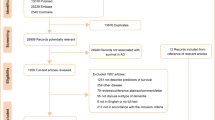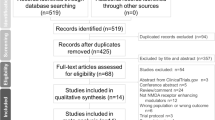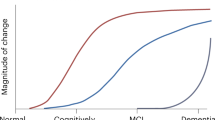Abstract
Mild-to-moderate AD patients were randomized to placebo or rosiglitazone (RSG) 2, 4 or 8 mg. Primary end points at Week 24 were mean change from baseline in AD Assessment Scale-Cognitive (ADAS-Cog) and Clinician's Interview-Based Impression of Change Plus Caregiver Input global scores in the intention-to-treat population (N=511), and results were also stratified by apolipoprotein E (APOE) genotype (n=323). No statistically significant differences on primary end points were detected between placebo and any RSG dose. There was a significant interaction between APOE ɛ4 allele status and ADAS-Cog (P=0.014). Exploratory analyses demonstrated significant improvement in ADAS-Cog in APOE ɛ4-negative patients on 8 mg RSG (P=0.024; not corrected for multiplicity). APOE ɛ4-positive patients did not show improvement and showed a decline at the lowest RSG dose (P=0.012; not corrected for multiplicity). Exploratory analyses suggested that APOE ɛ4 non-carriers exhibited cognitive and functional improvement in response to RSG, whereas APOE ɛ4 allele carriers showed no improvement and some decline was noted. These preliminary findings require confirmation in appropriate clinical studies.
This is a preview of subscription content, access via your institution
Access options
Subscribe to this journal
Receive 6 print issues and online access
$259.00 per year
only $43.17 per issue
Buy this article
- Purchase on SpringerLink
- Instant access to full article PDF
Prices may be subject to local taxes which are calculated during checkout




Similar content being viewed by others
References
Quick Facts On Dementia. Alzheimer's disease international web site. Available at: http://www.alz.co.uk/media/dementia.html Accessed September 22, 2005.
Strittmatter WJ, Saunders AM, Schmechel D, Pericak-Vance M, Enghild J, Salvesen GS et al. Apolipoprotein E: high-avidity binding to beta-amyloid and increased frequency of type 4 allele in late-onset familial Alzheimer disease. Proc Natl Acad Sci USA 1993; 90: 1977–1981.
Saunders AM, Strittmatter WJ, Schmechel D, George-Hyslop PH, Pericak-Vance MA, Joo SH et al. Association of apolipoprotein E allele epsilon 4 with late-onset familial and sporadic Alzheimer's disease. Neurology 1993; 43: 1467–1472.
Roses AD . Apolipoprotein E alleles as risk factors in Alzheimer's disease. Annu Rev Med 1996; 47: 387–400.
Corder EH, Saunders AM, Strittmatter WJ, Schmechel DE, Gaskell PC, Small GW et al. Gene dose of apolipoprotein E type 4 allele and the risk of Alzheimer's disease in late onset families. Science 1993; 261: 921–923.
Reiman EM, Caselli RJ, Yun LS, Chen K, Bandy D, Minoshima S et al. Preclinical evidence of Alzheimer's disease in persons homozygous for the epsilon 4 allele for apolipoprotein E. N Engl J Med 1996; 334: 752–758.
Alexander GE, Chen K, Pietrini P, Rapoport SI, Reiman EM . Longitudinal PET evaluation of cerebral metabolic decline in dementia: a potential outcome measure in alzheimer's disease treatment studies. Am J Psychiatry 2002; 159: 738–745.
Rossor MN, Kennedy AM, Frackowiak RS . Clinical and neuroimaging features of familial Alzheimer's disease. Ann NY Acad Sci 1996; 777: 49–56.
Bubber P, Haroutunian V, Fisch G, Blass JP, Gibson GE . Mitochondrial abnormalities in Alzheimer brain: mechanistic implications. Ann Neurology 2005; 57: 695–703.
Gibson GE, Haroutunian V, Zhang H, Park LC, Shi Q, Lesser M et al. Mitochondrial damage in Alzheimer's disease varies with apolipoprotein E genotype. Ann Neurol 2000; 48: 297–303.
Banks WA, Jaspan JB, Huang W, Kastin AJ . Transport of insulin across the blood-brain barrier: saturability at euglycemic doses of insulin. Peptides 1997; 18: 1423–1429.
Luchsinger JA, Tang MX, Shea S, Mayeux R . Hyperinsulinemia and risk of Alzheimer disease. Neurology 2004; 63: 1187–1192.
Watson GS, Craft S . The role of insulin resistance in pathogenesis of Alzheimer's disease: implications for treatment. CNS Drugs 2003; 17: 27–45.
Reger MA, Watson GS, Frey II WH, Baker LD, Cholerton B, Keeling ML et al. Effects of intranasal insulin on cognition in memory-impaired older adults: modulation of APOE genotype. Neurobiol Aging 2005 June 15 (Epub ahead of print).
Keller H, Dreyer C, Medin J, Mahfoudi A, Ozato K, Wahli W . Fatty acids and retinoids control lipid metabolism through activation of peroxisome proliferator-activated receptor-retinoid X receptor heterodimers. Proc Natl Acad Sci USA 1993; 90: 2160–2164.
Lehmann JM, Moore LB, Smith-Oliver TA, Wilkison WO, Willson TM, Kliewer SA . An antidiabetic thiazolidinedione is a high affinity ligand for peroxisome proliferator-activated receptor (PPAR). J Biol Chem 1995; 270: 12953–12956.
Adams M, Montague CT, Prins JB, Holder JC, Smith SA, Sanders L et al. Activators of peroxisome proliferator-activated receptor gamma have depot-specific effects on human preadipocyte differentiation. J Clin Invest 1997; 100: 3149–3153.
Feinstein DL, Galea E, Gavrilyuk V, Brosnan CF, Whitacre CC, Dumitrescu-Ozimek L et al. Peroxisome proliferator-activated receptor-gamma agonists prevent experimental autoimmune encephalomyelitis. Ann Neurol 2002; 51: 694–702.
Watson GS, Cholerton B, Reger MA, Baker LD, Plymate SR, Asthana S et al. Preserved cognition during rosiglitazone treatment in early Alzheimer's disease. Am J Geriatr Psychiatry 2005; 13: 950–958.
Birks JS, Harvey R . Donepezil for dementia due to Alzheimer's disease. Update of Cochrane Database System Review 2000; CD001190.
Olin J, Schneider L . Galantamine for Alzheimer's disease. Update in Cochrane Database System Review 2004; CD001747.
Birks J, Grimley Evans J, Iakovidou V, Tsolaki M . Rivastigmine for Alzheimer's disease. Update of Cochrane Database System Review 2000; CD001191.
Poirier J, Delisle MC, Quirion R, Aubert I, Farlow M, Lahiri D et al. Apolipoprotein E4 allele as a predictor of cholinergic deficits and treatment outcome in Alzheimer disease. Proc Natl Acad Sci USA 1995; 92: 12260–12264.
Greenberg S, Tennis MK, Brown LB, Gomez-Isla T, Hayden DL, Schoenfeld DA et al. Donepezil therapy in clinical practice. Arch Neurol 2000; 57: 94–99.
Winblad B, Engedal K, Soininen H, Verhey F, Waldemar G, Wimo A et al. A 1-year randomized placebo-controlled study of donepezil in patients with mild to moderate AD. Neurology 2001; 57: 489–495.
Ott A, Stolk RP, Hofman A, van Harskamp F, Grobbee DE, Breteler MM . Association of diabetes mellitus and dementia: the Rotterdam Study. Diabetologia 1996; 39: 1392–1397.
Curb JD, Rodriguez BL, Abbott RD, Petrovitch H, Ross GW, Masaki KH et al. Longitudinal association of vascular and Alzheimer's dementias, diabetes, and glucose tolerance. Neurology 1999; 52: 971–975.
Huang Y, Liu XQ, Wyss-Coray T, Brecht WJ, Sanan DA, Mahley RW . Apolipoprotein E fragments present in Alzheimer's disease brains induce neurofibrillary tangle-like intracellular inclusions in neurons. Proc Natl Acad Sci USA 2001; 98: 8838–8843.
Chang S, Ma TR, Miranda D, Balestra ME, Mahley RW, Huang Y . The lipid and receptor binding regions of apolipoprotein E4 fragments act in concert to cause mitochondrial dysfunction and neurotoxicity in cultured neuronal cells. Proc Natl Acad Sci USA 2005; 102: 18694–18699.
Harris FM, Brecht WJ, Xu Q, Tesseur I, Kekonius L, Wyss-Coray T et al. Carboxyl-terminal-truncated apolipoprotein E4 causes Alzheimer's disease-like neurodegeneration and behavioral deficits in transgenic mice. Proc Natl Acad Sci USA 2003; 100: 10966–10971.
Brecht WJ, Harris FM, Chang S, Tesseur I, Yu GQ, Xu Q et al. Neuron-specific apolipoprotein e4 proteolysis is associated with increased tau phosphorylation in brains of transgenic mice. J Neurosci 2004; 24: 2527–2534.
Dello Russo C, Gavrilyuk V, Weinberg G, Almeida A, Bolanos JP, Palmer J et al. Peroxisome proliferator-activated receptor gamma thiazolidinedione agonists increase glucose metabolism in astrocytes. J Biol Chem 2003; 278: 5828–5836.
Toseland CD, Campbell S, Francis I, Bugelski PJ, Mehdi N . Comparison of adipose tissue changes following administration of rosiglitazone in the dog and rat. Diabetes Obes Metab 2001; 3: 163–170.
Wilson-Fritch L, Nicoloro S, Chouinard M, Lazar MA, Chui PC, Leszyk J et al. Mitochondrial remodeling in adipose tissue associated with obesity and treatment with rosiglitazone. J Clin Invest 2004; 114: 1281–1289.
Wang YL, Frauwirth KA, Rangwala SM, Lazar MA, Thompson CB . Thiazolidinedione activation of peroxisome proliferator-activated receptor gamma can enhance mitochondrial potential and promote cell survival. J Biol Chem 2002; 277: 31781–31788.
McKhann G, Drachman D, Folstein M, Katzman R, Price D, Stadlan EM . Clinical diagnosis of Alzheimer's disease: report of the NINCDS-ADRDA Work Group under the auspices of Department of Health and Human Services Task Force on Alzheimer's disease. Neurology 1984; 34: 939–944.
Folstein MF, Folstein SE, McHugh PR . Mini-mental state. A practical method for grading the cognitive state of patients for the clinician. J Psychiatr Res 1975; 12: 189–198.
Roman GC, Tatemichi TK, Erkinjuntti T, Cummings JL, Masdeu JC, Garcia JH et al. Vascular dementia: diagnostic criteria for research studies. Report of the NINDS-AIREN International Workshop. Neurology 1993; 43: 250–260.
Rosen WG, Mohs RC, Davis KL . A new rating scale for Alzheimer's disease. Am J Psychiatry 1984; 141: 1356–1364.
Schneider LS, Olin JT, Doody RS, Clark CM, Morris JC, Reisberg B et al. Validity and reliability of the Alzheimer's disease cooperative study-clinical global impression of change. The Alzheimer's disease cooperative study. Alzheimer Dis Assoc Disord 1997; 11(Suppl 2): S22–S32.
Gelinas I, Gauthier L, McIntyre M, Gauthier S . Development of a functional measure for persons with Alzheimer's disease: the disability assessment for dementia. Am J Occup Ther 1999; 53: 471–481.
Cummings JL, Mega M, Gray K, Rosenberg-Thompson S, Carusi DA, Gornbein J . The Neuropsychiatric Inventory: comprehensive assessment of psychopathology in dementia. Neurology 1994; 44: 2308–2314.
MacLeod MJ, De Lange RP, Breen G, Meiklejohn D, Lemmon H, Clair DS . Lack of association between apolipoprotein E genoype and ischaemic stroke in a Scottish population. Eur J Clin Invest 2001; 31: 570–573.
Author information
Authors and Affiliations
Consortia
Corresponding author
Additional information
Supplementary Information containing acknowledgements and a list of investigators and clinical sites accompanies the paper on The Pharmacogenomics Journal website (http://www.nature.com/tpj)
Supplementary information
Rights and permissions
About this article
Cite this article
Risner, M., Saunders, A., Altman, J. et al. Efficacy of rosiglitazone in a genetically defined population with mild-to-moderate Alzheimer's disease. Pharmacogenomics J 6, 246–254 (2006). https://doi.org/10.1038/sj.tpj.6500369
Received:
Revised:
Accepted:
Published:
Issue Date:
DOI: https://doi.org/10.1038/sj.tpj.6500369



